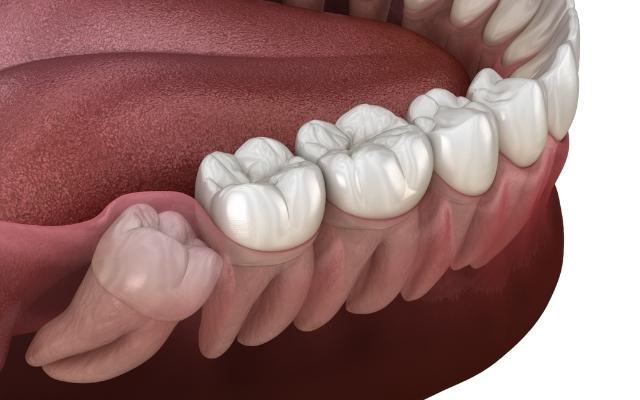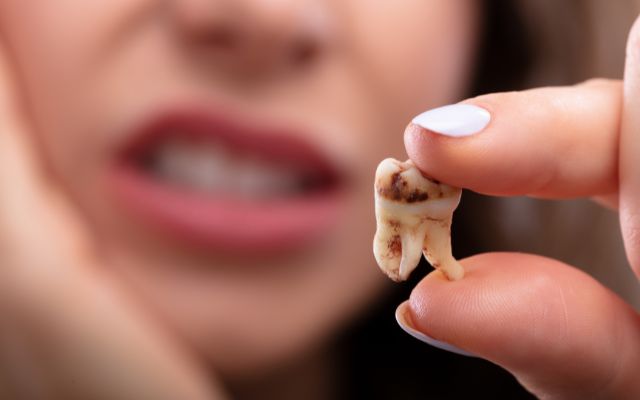What To Eat After Wisdom Teeth Removed: Wisdom teeth, also known as third molars, are normally the last teeth to erupt and are located towards the back of the mouth. After having your wisdom teeth out, it is crucial that you receive the proper nutrients. This article concludes with information regarding the top soft foods.
Let’s get started!
Overview of Wisdom Teeth


The third molars are also known as wisdom teeth. They develop at the rear of the gums and are often the last to erupt.
The majority of people have four wisdom teeth, one in each corner of the rear of the mouth. However, because there is little space in the rear of your mouth, your wisdom teeth may erupt at an angle or partially. These are called wisdom teeth that are impacted.
Impacted wisdom teeth might create numerous complications. They may become infected, harm adjacent teeth, cause crowding, or decay if they are difficult to clean. To address these issues, wisdom teeth extraction is a common solution. However, wisdom teeth should only be extracted if they create issues.
After having your wisdom teeth out, it is crucial that you receive the proper nutrients. A nutritious diet reduces the incidence of problems, aids in reducing edema, nourishes the body, and promotes wound healing.
After surgery, you should consume foods that are soft and easy to chew. To aid in wound healing, they should also be rich in vitamins, minerals, energy, and protein.
10 soft Foods Eat After Your Wisdom Teeth Removed


1. Blended soups
After having your wisdom teeth extracted, you should consume blended soups like tomato or pumpkin soup. They are simple to take and contain no particles that could irritate the surgical site.
In addition, soups are typically an excellent source of vitamins and minerals. This helps you achieve the daily nutrition requirements when you are unable to consume several fruits and vegetables in their complete form.
Additionally, blended soups can keep you hydrated, which is vital following surgery. It is prudent to serve soups that are lukewarm or chilly, as heated soups might cause irritation. Also, ensure that vegetable-based soups are as smooth as possible to prevent the formation of pieces.
2. Stocks
Similar to soups, broths provide good sustenance after dental surgery. In addition to being delicious, they are also rich in vitamins and minerals. Furthermore, broths are an excellent method to stay hydrated if you have trouble drinking enough water.
The health advantages of bone broth are often claimed. Animal bones and connective tissue are simmered to create a nourishing stock. Although there are no direct studies on the health benefits of bone broth, research on its constituents suggests it may have anti-inflammatory properties (2 Trusted Source, 3 Trusted Source).
Consume the broth either at room temperature or chilled to avoid aggravating the wound.
3. Greek yogurt
Greek yogurt is a protein-rich, nutrient-dense food that can be consumed after dental surgery. It has a silky, creamy consistency that may help calm and numb the mouth.
Greek yogurt is an excellent source of protein, vitamins, and minerals like calcium and zinc (4 Trusted Source). Protein-rich diets may aid in the healing process. Multiple studies have connected a low-protein diet to a delayed rate of recuperation (5 Trusted Source, 6 Trusted Source).
In addition, research indicates that enough zinc consumption may enhance wound healing (7 Trusted Source, 8 Trusted Source, 9 Trusted Source).
However, if your zinc levels are adequate, ingesting extra zinc may not provide any further benefits. However, many zinc-rich foods, such as steak and other meats, are difficult to ingest after dental surgery; therefore, Greek yogurt is an excellent substitute.
4. Potatoes mashed together


Potatoes are a versatile root vegetable that may be cooked in several ways. In particular, mashed potatoes might be comfortable after having your wisdom teeth out.
They are rich in calories and nutrients, both of which are essential for healing (10 Trusted Sources). This is due to the fact that after surgery, an individual’s energy requirements are slightly increased.
If you’re trying to eat enough food, mashed potatoes are an excellent food option because you can ingest a lot of nutrients and energy in a few bites (6 Trusted Source, 11 Trusted Source). Ensure that your mashed potatoes are either lukewarm or cold, as heated meals may irritate the incision.
5. Scrambled eggs
Eggs are among the greatest things to consume following the extraction of your wisdom teeth. They are an excellent source of protein and vitamins and minerals.
When purchasing eggs, look for pasteurized or omega-3-enhanced kinds. Omega-3 fatty acids may promote wound healing (12 Trusted Source). In comparison to other egg preparations, scrambled eggs may be easier to chew and swallow.
6. Applesauce
Apples are tough and crunchy, which is undesirable after having wisdom teeth out. Eating applesauce is one method to consume more fruit without experiencing irritation.
However, applesauce is frequently made from skinless and coreless apples that have been puréed, which decreases their nutritional value. This is due to the skin’s high vitamin, mineral, and fiber content.
Nonetheless, an apple without the skin is an excellent source of vitamins such as vitamin C. This vitamin may help strengthen the immune system, which may promote wound healing (13 Trusted Source, 14 Trusted Source).
7. Mashed bananas
Bananas are one of the world’s most popular fruits. They are easy to chew and swallow after dental surgery because of their soft texture.
Moreover, bananas are extremely nutrient-dense and a rich source of vitamins and minerals, including potassium, vitamin B6, manganese, and folate (15 Trusted Source). Bananas can be further softened by mashing in order to lessen the risk of pain.
8. Banana ice cream


People frequently recommend eating ice cream when recovering from wisdom tooth extraction. Despite the fact that the cold may have a calming effect on the wound, normal ice cream is often heavy in sugar and fat. Homemade banana ice cream is a nutritious and delicious alternative to traditional ice cream.
9. Avocado
Avocados are a distinctive fruit. Unlike most fruits, avocados are low in carbohydrates but high in healthy fats. Their silky, creamy texture makes them ideal for eating while healing from the extraction of wisdom teeth. Avocados are a great source of vitamin K, vitamin C, and potassium and are extremely healthy (16Trusted Source).
According to one animal study, avocados may accelerate wound healing. Although this study does not prove that avocados accelerate wound healing in humans, the findings are encouraging (17Trusted Source).
Despite the fact that avocados are often simple to consume, it may be easier to have whipped or mashed avocado throughout your rehabilitation.
Try mixing fruits and veggies to your protein of choice in the blender. It is preferable to utilize fruit without seeds, therefore you should avoid strawberries and blackberries.
10 Smoothies
When you are unable to consume a complete meal, smoothies are an excellent option to supplement your nutrition. They are flexible and simple to consume. You may tailor smoothie components to your preferences and nutritional objectives.
Smoothies with Greek yogurt or protein powder, for instance, can considerably increase your protein consumption, which is essential for recuperation. According to studies, a low protein intake may hinder the recuperation process (5Trusted Source, 6Trusted Source).
Try mixing fruits and veggies to your protein of choice in the blender. It is preferable to utilize fruit without seeds, therefore you should avoid strawberries and blackberries.
Avoiding Foods


Following oral surgery, a variety of foods can irritate the healing wounds in the mouth.
Here are some items to avoid following removal of your wisdom teeth:
- Spicy foods can cause discomfort and inflammation.
- Crunchy and crumbly foods (such as chips or cookies): may become trapped in a wound and impede healing.
- The majority of grains and seeds can also become embedded in a wound and impede its healing.
- Chewy foods: can increase your risk of biting your cheek, lips, and tongue, particularly immediately after surgery when your mouth is still numb.
- Alcohol: may aggravate the wound or interact with any recommended medicine (it is best to abstain completely throughout the healing time).
Additionally, it is crucial to avoid using straws when recovering from wisdom tooth extraction. The suction created by straws in the mouth increases the chance of having a dry socket.
The painful condition of a dry socket occurs when the blood clot protecting the area where the tooth was extracted becomes dislodged. Consequently, the underlying bones and nerves are exposed to air, causing pain and delaying healing.
Contact Us


It is recommended that you visit the dentist every six months for a dental checkup and cleaning in order to maintain the health of your teeth and keep them looking white. Get in touch with the Hotline or make an appointment in order to sign up for wisdom teeth pain and extraction or check your case at the Spring Orchid Bassendean Dental Clinic.
FAQs
When can I resume my normal diet after having my wisdom teeth extracted?
Many people are able to resume normal eating habits within a week after having their wisdom teeth out.
In the days and weeks following the extraction of your wisdom teeth, it is vital to consume a diet rich in soft, tasty, and nutritious foods. As long as you consume the appropriate foods and avoid those that can hinder your recovery, you will feel more comfortable and lower your risk of infection.
Can I consume spaghetti after removing my wisdom teeth?
After having your wisdom teeth out, you may desire a bowl of pasta. Generally, pasta is delicious, but only when cooked until very tender; avoid anything “al denta.” Additionally, try to avoid tomato-based sauces, since their acidity may irritate the extraction site.





